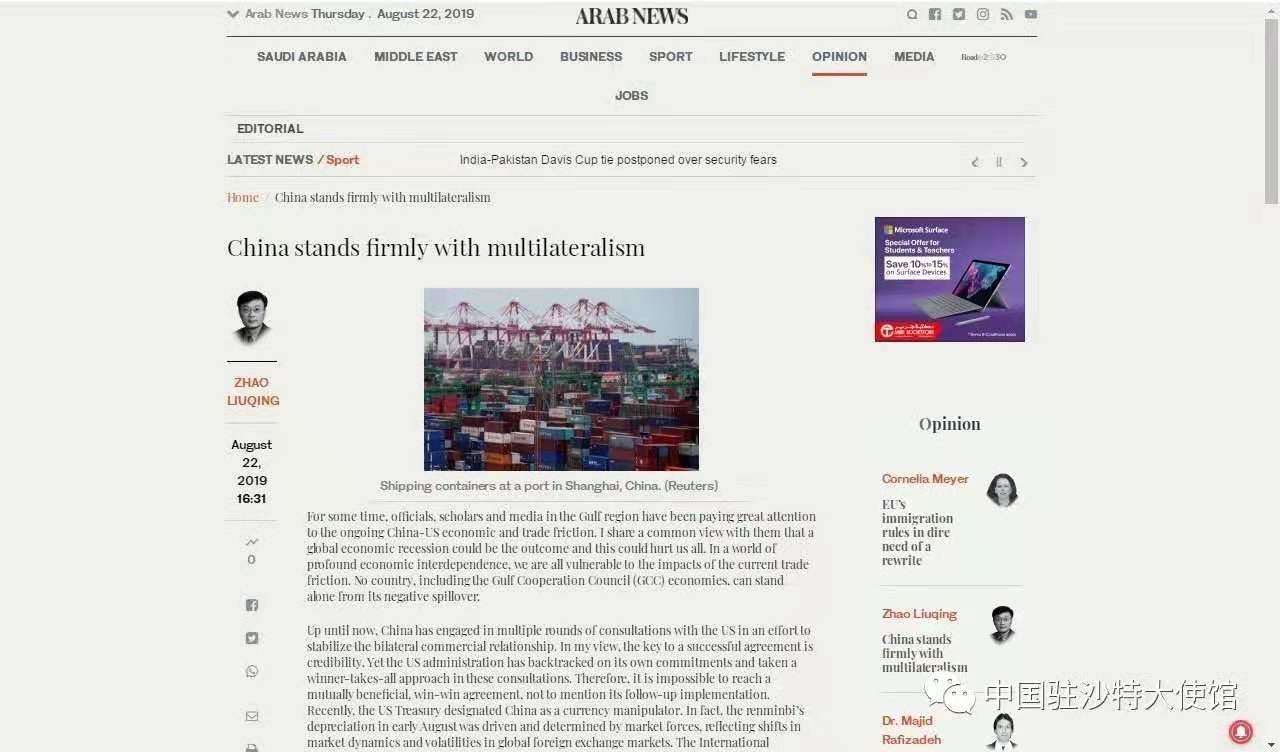Minister Counselor for Economic and Commercial Affairs of the Embassy of People’s Republic of China in the Kingdom of Saudi Arabia published a signed article on Arabnews entitled An Open and Inclusive World Economy Matters to All on international economic governance, China-US economic and trade friction and Chinese economic state. Here is the full text of the article:
For some time, officials, scholars and media in the Gulf region have been paying great attention to the ongoing China-US economic and trade friction. I share a common view with them that a global economic recession could be the outcome of the ongoing China-US trade tension and this could hurt us all. In a world of profound economic interdependence, we are all at stake under the impact of the current trade friction. No country, including the GCC economies, could stand alone from its negative spill-over.
Up until now, China has engaged in multiple rounds of consultations with the US in an effort to stabilize the bilateral commercial relationship. In my view, the key to a successful agreement is credibility. Yet the US administration has backtracked on its own commitments and taken a winner-takes-all approach in these consultations. Therefore, it is impossible to reach a mutually beneficial and win-win agreement, not to mention its follow-up implementation. Recently the U.S. Treasury designated China as a currency manipulator. Actually, the RMB depreciation in early August has been driven and determined by market forces, reflecting shifts in market dynamics and volatilities in global foreign exchange markets. The International Monetary Fund, in its just concluded Article IV consultation, came to a conclusion that the RMB was broadly in line with the fundamentals of Chinese economy.
In the past 40 plus years of reform and opening-up, China has shared opportunities and benefits with the rest of the world through two-way opening up and actively integrating itself into the international division of labor and the global industrial, innovation and value chains. We put faith in multilateralism and stood firm in face of difficulties. Our efforts finally paid off. China has not only achieved its own development but also brought benefits to the international community. In the past few years, Statistics has shown that China, as the world’s second largest economy with an annual growth rate over 6%, has contributed nearly one third of world economic growth and has undoubtedly became a global economic powerhouse.
To be honest, the current Chinese economy is indeed under some pressure. Yet it is highly resilient and the growth remains strong and robust. This July, the actual use of foreign capital increased by 4.1% compared with last year, reaching 8.07bn US dollars, which is a new high in 2019. Foreign investors are voting for confidence in China’s economy. By rolling out nationwide the management system of pre-establishment national treatment plus a negative list, establishing six new pilot free trade zones, an enabling environment for business has been put in place for foreign investments. In the first half of 2019, China’s economy has registered steady growth and has been operating within a proper range. The economic fundamentals remained stable with a positive momentum.
Global economy, on the other hand, is indeed facing major challenges as protectionism and anti-globalization mood are spreading across the world. We are all passengers on the same boat, and no one could be a winner if the boat is sinking. Joint challenges require joint efforts. In this regard, history could be a mirror. 11 years ago, facing the international financial crisis, 20 major economies across the world put enormous effort in supporting multilateralism to coordinate macro-economic policies and support free trade and investment, thus stabilizing global economy, promoting market confidence and gradually lifting growth. 11 years later, we are once again standing at the crossroads. Either we pursue our own development at the cost of others, or we can renew the spirit of partnership and make joint efforts in making globalization more inclusive and bringing more benefits to our people.
For China, we stand firmly with multilateralism. We support strengthening international institutions, in particular, improving international economic governance. We must abandon the zero-sum mindset in global policy-making and pursue shared growth through discussion and collaboration. It is in China’s belief only by cooperating with international partners including the GCC countries, ASEAN, and EU, can China truly achieve its own development. We uphold the principle that cooperation should be on an equal footing and mutually beneficial.
GCC countries are China’s most important economic and trade partners in MENA. Later this year, Saudi Arabia will assume the Presidency of the Group of Twenty. High expectations and spotlights of the world would then be put on the kingdom. Saudi Arabia is therefore uniquely well placed to play a major role in steering the world economy forward to be more strong, sustainable, balanced and inclusive. China has full confidence in Saudi Arabia’s leadership in that.
Link:http://www.arabnews.com/node/1543791

